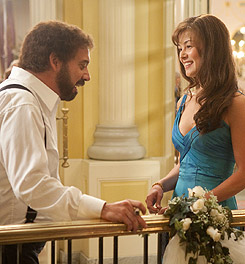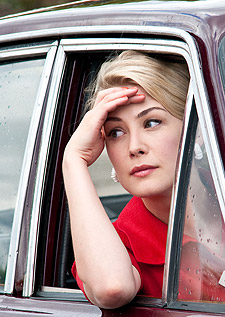
Interview Date: 01/06/2011
Run Date: 01/13/2011
Interviews Home / Movies Home / Bullz-Eye Home
It's difficult to talk about Rosamund Pike and not use the word "class." Yes, she's a highly educated, elegantly beautiful woman from England, but there's a lot more to it than that. A versatile actress with a sharp streak of humor, onscreen she exudes self-possession and, when the role allows, a touching dash of sweetness.
An experienced stage actress who studied at Oxford, and before that, the intriguingly named Badminton School, Pike faced her first round of worldwide attention back in 2002 as James Bond's non-Halle Berry sex interest in "Die Another Day." Numerous other roles followed, including playing the good-natured Jane Bennett in the 2005 version of "Pride and Prejudice" and appearing alongside Anthony Hopkins and Ryan Gosling in the 2007 thriller, "Fracture." Pike's visibility has nevertheless increased markedly just over the last 12 months or so. That's largely because of her role in last year's Oscar-nominated "An Education," in which she played the thoroughly uneducated girlfriend of con man Dominic Cooper, a sort of anti-role model for Carey Mulligan's young protagonist.
That appears to be only the beginning. Pike was as stand-out among a top-notch cast as a posh housewife stuck in a velvet-lined cage in the underrated "Made in Dagenham." Moreover, she gives something bordering on a tour de force performance opposite Paul Giamatti in the new film version of Mordecai Richler's 1997 final novel, "Barney's Version." The tragicomic fictional biopic casts her as Miriam Grant-Panofsky, the entirely admirable and long suffering third wife of Giamatti's 1970s Montreal gonif turned professional modern-day alter kocker, Barney Panofsky. She initially finds herself the reluctant object of his sudden and intense affection at a meet-not-so-cute: his second wedding.
In person, Rosamund Pike is the commanding presence you'd guess, and I'm delighted to say that she can be a funny and charmingly blunt interview subject. She also showed some understandable caution when a bit of mild pre-interview confusion prevented her from knowing what publication she was talking to. She started the conversation with an inquiry of her own…
Rosamund Pike: Tell me about Bullz-Eye.
Bullz-Eye: We're a very classy online men's magazine. Don't worry, it's not going to be one those interviews.
RP: Okay.
BE: In fact, maybe I'll open with a question I wasn't originally going to start with. I've noticed a difference between British and American media. We tend to think of the British as being very, very polite...
RP: Well, they're not.
BE: Especially not the press. How's it been for you dealing with the American press versus the British press?
RP: I suppose the difference is the American press tends to be generally nicer to your face. I don't really read my own interviews. I don't really know how they come out. The British press, they often have a need to, I suppose, slightly put you down. They want to say "None of your airs and graces, I know who you are. I know what street you live on. I know where you come from, I know where you go grocery shopping, so cut the crap."
BE: [Laughing] I see that.
RP: It's a shame. The British are generally less good at celebrating their own. However, what they do quite like is someone that they've given a hard time to and they can sort of rehabilitate. They like to be in control. If everybody is adoring, they'll be looking for the chance to knock them off the pedestal.
BE: I think the build-'em-up-tear-'em-down thing happens here as well.
RP: It does? Okay.
BE: But, maybe in a less radical way. We wait for an excuse.
RP: Of course, the whole culture of gossip magazines has come out of America to Britain, but then we've taken it and really perfected it.
BE: I've spoken to a couple of Oscar winners, but you are my first "Bond girl." We are going to talk a little bit about that in a bit, but first I have to say I've been really impressed. I thought you were wonderful in "Barney's Version," and you really kind of blew me away in "Made in Dagenham."
RP: Oh, good.
BE: I have to say that the two parts are not completely different. In that, in both, you're playing extremely intelligent women who are housewives. One's obviously a lot more frustrated than the other.
 RP: It's true. They've both put their own careers on hold for the men. That's true. I hadn't really thought about that. The period is so telling in "Made in Dagenham" and the period didn't feel quite such a pressure in "Barney's Version" – because Miriam obviously had had a great career which she choose to give up in order to have children. I think it was a peculiarity of the 60s that a woman with a degree was kind of almost more for the benefit of a man, so he could say he had a clever wife, than it was for the woman to really extend herself to greater professional capabilities. Miriam's really a freer spirit when she met Barney.
RP: It's true. They've both put their own careers on hold for the men. That's true. I hadn't really thought about that. The period is so telling in "Made in Dagenham" and the period didn't feel quite such a pressure in "Barney's Version" – because Miriam obviously had had a great career which she choose to give up in order to have children. I think it was a peculiarity of the 60s that a woman with a degree was kind of almost more for the benefit of a man, so he could say he had a clever wife, than it was for the woman to really extend herself to greater professional capabilities. Miriam's really a freer spirit when she met Barney.
BE: Definitely. Now, as far as I know, this is the first time you've aged like this [roughly 30 years] in a movie.
RP: Yeah, it is.
BE: What was that like?
RP: Something I hope I don't have to do again until I'm the correct age. [Laughs] No, it's nice because you actually lose the pressure of being the girl in the movie who has to be pretty, or whatever. The focus on the love affair is – I don't mean to sound so shallow – but it's about who these two people are, not here's a hot, young couple who you want to sort of see get naked.
BE: [Laughing] One more than the other, maybe...
RP: Which is not what anyone really ever wants to see, actually, but it's what a lot of people who make movies think people want to see. What people really want is something they identify with, which is what I think we have with Barney and Miriam, that people of all ages can see themselves in.
BE: Whenever you have a movie where the leading man – Seth Rogen gets this all the time -- that he's [seen as being] not good looking enough for...
RP: His leading ladies, right.
BE: [Paul Giamatti] is obviously absolutely a first-rate actor, but it must have been a little bit different working with him than with working with somebody like, say, Pierce Brosnan or Ryan Gosling. Or maybe not?
RP: I don't know. It is not. I'm mad about Paul. I'm totally mad about him. The love story in this film is so much greater than any love story I've ever told on film. I just believed in us. I believed in Barney and Miriam's love. For me, it's always a mental connection. It's something that ignites and you find the other person incredibly attractive, that tends to be the order for me. I'm not really good at answering the question because that's not the way I think.
BE: It's probably the right way to think for an actor, though.
RP: For me, to be perfectly honest, I found Paul far more attractive than Pierce Brosnan. That is my genuine reaction.
BE: [Laughing] Well, on behalf of all the guys that look more like Paul Giamatti than Pierce Brosnan...
RP: Because it's Paul, you can't be someone who looks like Paul Giamatti because there is only one. It has to do with the spirit that comes through the eyes. It can't just be someone who says, "I'm the great doppelganger for Paul Giamatti, wanna kiss me?"
BE: [Laughing] Right.
RP: I can admire a man's good looks sort of objectively, but if I'm not excited by him, I'm not gonna fancy him.
BE: Well, all right. So, I was looking back at some clips of you from the Bond movie. You're very good at not blinking. There's a video of Michael Caine talking about it online. It's a way of showing power. The scene with Judi Dench, which I know was tough for you – or at least that's how they quoted you...
RP: Yeah, yeah.
BE: It's almost like a staring contest. [Laughing]
RP: The scene with Judi?
BE: She's got her eyes wide open and you've got your eyes wide open. Is that something you're conscious of?
RP: A lot of it is the shape of my eyes. No?
BE: I'm sure that's part of it, but you're not blinking.
RP: Am I blinking now?
BE: [Laughing] So, you're not conscious of it?
RP: Am I blinking now?
BE: No, not at this moment.
RP: I look people in the eye. I don't really think about it. I don't really think technically at all. I also know I have some takes that are problems because I double-blink sometimes, too. I can sometimes get a little twitch and do a lot of blinking and so maybe they just edit out those.
BE: I'm sure that's part of it, they edit for the performance, but I was just noticing it.
RP: How funny. It sounds like a slightly weird robotic thing. I hope it doesn't come across that way.
BE: No, no, it's great. What Michael Caine actually says about it is that if you want to portray power, you should not blink. If you want to appear weak, then you blink like crazy.
RP: Okay, very interesting.
[Note: You can see the brief Michael Caine video in question here. I actually slightly overstated the case about the sequences from "Die Another Day" – there's actually even less blinking in Ms. Pike's scene with Halle Berry.]
BE: This is a silly question, but do they actually play badminton at the Badminton School?
 RP: Not really, no. I'm actually learning how to play table tennis at the moment. That's my new hobby. I've been having table tennis lessons out here in L.A. No, it's not named after that. We definitely do play a bit of badminton, but it's not named after that. Unfortunately, in "Barney's Version," there was a small scene of playing badminton with the kids. Paul and I's kids were much better at badminton than I was.
RP: Not really, no. I'm actually learning how to play table tennis at the moment. That's my new hobby. I've been having table tennis lessons out here in L.A. No, it's not named after that. We definitely do play a bit of badminton, but it's not named after that. Unfortunately, in "Barney's Version," there was a small scene of playing badminton with the kids. Paul and I's kids were much better at badminton than I was.
BE: Speaking of "Barney's Version," I guess this is at least the second movie you've done with a North American accent. I've noticed that actors have been getting better at accents over the last 20 or 30 years.
RP: Yeah, I think so. Maybe it's the rise of dialect coaches. It's so technical. It's so specific. I love having it as another string to my bow. It also means, if I don't want to seem like a tourist and get ripped off, I can just turn on an American accent and people aren't going to think, "Here's a dumb Brit who we can stick for a lot of money."
BE: I don't think they think that way. [Americans] think you're smarter than us. Were they going for a particular accent? [Forgetting for a second that Miriam is not Canadian], I've actually been to Montreal...
RP: No, it's not because Miriam's not from Montreal. She's from New York. We were just going for something, radio, really. NPR.
BE: She's in public radio, that makes total sense. Now, did you film much in Montreal?
RP: Everything's in Montreal. Montreal's a sort of big character in the film. It was so cool because all the places, all the bars, Grumpy's Bar – and it was where Mordecai Richler lived – everything was [there]. Our producer was a wonderful stickler for accuracy. Even to the extent of using the Ritz-Carlton, where we do those scenes, it's actually where we meet in the ballroom, then we do the scene where he has Alzheimer's in the garden. They're knocking the Ritz-Carlton down and turning it into condos. So, our producer paid to have them delay their construction by two weeks.
BE: Really?
RP: He built the whole garden again, even to the point of hatching ducks on the pond months in advance so that they'd be familiar with the environment and wouldn't fly away. He was obsessed about it because that was where Mordecai and his wife, Florence, used to go for lunch every day before Mordecai died. So, he really wanted it to be in the right place. It is wonderful when you film in cities. I was watching the "Bourne" films again recently. The sense of place in them is so wonderful. You know that you're in Madrid or in Paris or in London. So often these days budget dictates that you have to pretend. Montreal can be fine for New York, or whatever.
BE: Let's talk about "An Education." For a lot of people, for some reason – I mean, it was a really good performance – but that one seems to have really put you on the map.
RP: It's funny, isn't it? You never know what it's going to be. I should have gone and promoted it. [Laughing] I was doing "Barney's Version." I didn't do a single bit of press, I didn't do a single premiere. I didn't do anything. Funny.
BE: But it is a different kind of role for you. Usually you have been playing very smart people.
RP: Yeah.
BE: This is the first time you're playing somebody who was...
RP: Who was dumb.
BE: If you want to be so blunt about it.
RP: She was thick as shit, wasn't she? It was a great relief, actually. A lot of sweet humor can come out of it from just not understanding, being totally perplexed. I often feel incredibly confused most of the time in my real life. It's a bit of a relief to have a bit of typecasting for a change.You can follow us on Twitter and Facebook for content updates. Also, sign up for our email list for weekly updates and check us out on Google+ as well.











